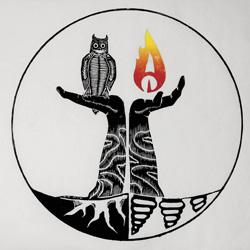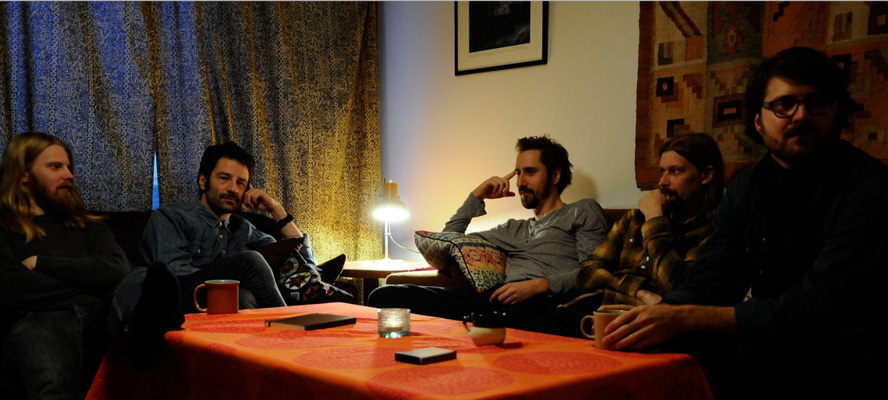 POINTING THE FINGER - Malady
POINTING THE FINGER - Malady
Writing in The Guardian recently, Hanif Kureishi opined that “the best art combines experiment with popularity, taking the audience from someone familiar to somewhere new, exploring the not-yet-said.” The novelist could easily have had Helsinki’s Malady in mind. The Finnish progressive five-piece’s second album ‘Toinen Toista’ is certainly a work of art, boasting five beautifully crafted and exquisitely executed compositions ranging from the brief instrumental interlude ‘Laulu Sisaruksille’ to the expansive and extremely beautiful twenty-three minute album closer ‘Nurja Puoli’.
Malady – Tony Björkman (guitar), Babak Issabeigloo (guitar/vocals), Ville Rohiola (keyboards), Jonni Tanskanen (bass) and Juuso Jylhänlehto (drums) – opened their account with a self-titled album in 2015 which made waves in the progressive rock scene. ‘Toinen Toista’ takes things at least one step further, as Tanskanen is happy to point out.
“I think ‘Toinen Toista’ is less fragmented, more mature and far more ambitious than our debut. The old ‘Malady sound’ is still there, but we experimented with a lot of different instrumentation. For example, in terms of keyboards and synths, the first album was very Hammond-driven, whereas on ‘Toinen Toista’ we’ve given an equal and sometimes larger role to Mellotron and Wurlitzer. Secondly, everybody chimed in from the beginning, which resulted in a more cohesive whole. Compared to the first album, we’re more comfortable with each other’s style of playing and know each other’s strengths and how to play off each other. We wanted to surpass the first album in as many ways as possible: musically, tonally, dynamically… I think we nailed it in every aspect.
“Also,” the bassist continues, “I think the album works really well as whole, but the individual tracks can stand alone as well. I tend to think of it in vinyl terms, with the shorter songs on the A-side and one long track on side B. Quite a few people have also said that, despite its length, ‘Nurja Puoli’ doesn’t wear the listener out. We feel that way ourselves, so it’s nice to hear it from other people as well. And personally I love Esko Grundström’s classical arrangement in ‘Laulu Sisaruksille’. It still gets me every time.”
My suggestion that it’s a Seventies’ prog rock album executed with twenty-first century prog metal attitude is quickly shot down in flames. “Not really. I don’t know what ‘prog metal attitude’ is, but we’ve never really taken cues from prog metal. I bet there’s some accidental overlay with numerous genres. When I think about contemporary prog metal I immediately think of extremely technical stuff, nine-string guitars and triggered drums. That stuff is quite a way removed from our approach. I think that one of the reasons we formed the band was just to improve as musicians, and for me that’s an ongoing process. Malady is a brilliant means for that, since progressive music allows for lots of variance in composing and playing.”

There’s not a lot in the way of vocals – Malady’s music offers vast musical soundscapes interspersed with lyrical passages – but they are delivered in Finnish. Twenty years ago this would have been pretty much unheard of, and I wondered if this was a kind of nationalistic approach or an acceptance now that great music can transcend any barriers, even those created by language. A badly phrased question though elicits another reproach, with Tanskanen poining that that the band would not want to be “in any way associated with nationalism, what with the current political climate and people seeing homeland as the main building block for their identity and using it as a tool for exclusion and hate. We chose Finnish because it allowed us to better convey meaning, and it allowed for wordplay more fluently than English would, and because we like the Finnish language, without any nationalistic undertone. I don’t know if we’d be more popular if we had English lyrics, but it’s not something we’ve ever considered. I very much doubt we’ll have a song in a different language unless there’s a compelling reason for it. For us, vocals are one instrument among others. We didn’t want to single it out; it’s one part of a whole. I’m guessing people listen to our music primarily because of the music itself rather than the lyrics. I might be wrong, though.”
The downside is, of course, that it’s impossible for many listeners to pick up on lyrical themes. “We get asked this all the time, so we should really start making some kind of translation,” he laughs. “The problem though is that we’d rather not give an explicit answer to this because the the album is laden with symbolism. The name denotes either a date, February 2nd, the relationship between two people (‘one to another’) or other things depending on context. It is ambiguous for a reason. In our press release, it states that ‘at its core lays the basic questions of being human and the transient nature of things’ and that’s a rather good summary.
”To me, it’s about duality and juxtaposition. There’s a range of topics, like different outomes depending on the paths taken in life, science versus religion, passion versus knowledge. But at the end of the day, we’d like people to make up their own interpretations about it, although I can understand that that can be frustrating if you don’t understand the language. And to be honest, I don’t even know what our chief lyricist Juuso himself meant to convey with it – he never even told the rest of us!”
With time running to an end I ask Tanskanen my favourite question about trivia. At first the bassist stumbles – “I’m drawing a blank with this one” – before pointing out that “three different Mellotrons were used in the production of the new album; one Mark VI and two M400s. As far as we know, that accounts for about 40-50% of all Mellotrons found in Finland. And, incidentally, one of them belongs to us.”
As for the band’s name, “this is the most boring story ever, but the name was picked out of an English dictionary, quite literally just opening it up at a random spot, pointing a finger and coming across the word. I wish we had an epic story about it, but there’s no deep meaning behind it. That said, the name had a good ring to it. I mean, we wouldn’t have chosen ‘cutlery’ if we’d picked it!”
(c) John Tucker March 2018
